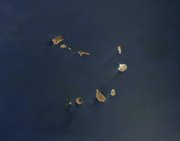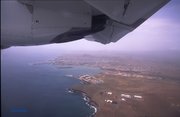Cape Verde
|
|
Cape Verde (Portuguese: Cabo Verde) is a republic located on an archipelago of the North Atlantic Ocean, off the western coast of Africa. The previously-uninhabited islands were discovered and colonized by the Portuguese in the 15th century; they subsequently became a trading centre for African slaves. Most Cape Verdeans descend from both groups.
"Cape Verde" is named for Cap-Vert, now in Senegal, the westernmost point of Africa.
| |||||
| National motto: Unity, Work, Progress | |||||
| Missing image LocationCapeVerde.png image:LocationCapeVerde.png | |||||
| Official language | Portuguese (official) and nine Portuguese creoles | ||||
| Capital and Largest City | Praia | ||||
| President | Pedro Pires | ||||
| Prime Minister | José Maria Neves | ||||
| Area - Total - % water | Ranked 146th 4,033 km² Negligible | ||||
| Population
| Ranked 164th
| ||||
| GDP (PPP)
| 600 millions $
| ||||
| Currency | CV Escudo | ||||
| Time zone | UTC -1 | ||||
| Independence
| (from Portugal) | ||||
| National anthem | Cântico da Liberdade | ||||
| Internet TLD | .cv | ||||
| Calling Code | 238 | ||||
| Contents |
History
Main article: History of Cape Verde
Cape Verde was uninhabited when the Portuguese arrived in 1456, and the islands were thus made part of the Portuguese empire. Due to its location off the coast of Africa, Cape Verde became an important port, and was a major center of the slave trade.
In 1975, the islands achieved independence, partially due to the efforts of the African Party for the Independence of Guinea-Bissau and Cape Verde (PAIGC). After independence, the PAIGC attempted to unite Cape Verde and Guinea-Bissau into one nation, the PAIGC controlling both governments, but a coup in the latter nation in 1980 ended these plans. In Cape Verde itself the PAICV (affiliated with the PAIGC) governed until elections were held in 1991 that resulted in a change of government. The PAICV was re-elected in 2001.
Dr Marcel Gomes Balla of Boston University has written a short history of these islands, Antonio's Island ISBN 1898030480, covering The 'official' discovery of Cabo Verde, The Treaty of Tordesilhas- the complete text-in English, The Cape Verdean navigator who made an extraordinary impact on America, Africa, Europe and Asia, The involvement of the church with slavery, The historical ties between Cabo Verde and Columbus, Cabo Verde Vasco da Gama and Cabral, The creation of Brazil, The historical ties with Italy and other countries, The first non-Europeans to cross the Atlantic with a regular sailing schedule and a lot more useful information such as: Portraits of Cape Verdean navigators published for the first time for the public (Africans , mestizos, Europeans, but always Cape Verdeans). Still other famous Cape Verdeans in science, politics etc. Maps confirming the discovery of the islands and the importance of Cape Verdeans and Cabo Verde in world history.
Politics
Main article: Politics of Cape Verde
The government of Cape Verde is based on a Constitution that was established in 1980. Elections are held for both the Prime Minister and President, who both govern for 5-year terms. Members of the General Assembly are elected as well, and they appoint the Supreme Court along with the President and Prime Minister.
See also: President of Cape Verde, National symbols
Geography
Main article: Geography of Cape Verde
Cape Verde is an archipelago off the coast of Africa. It is formed by 10 main islands and about 8 islets. The main islands are:
- Barlaventos (northern island group)
- Sotaventos (southern island group)
Of these, only Santa Luzia is uninhabited. Presently it is a Natural Reserve. All islands are volcanic, but an active volcano exists on one of the islands, Fogo. See Mount Fogo.
Municipalities
Mindelo_portogrande.jpg
Cape Verde is divided into 17 municipalities (concelhos, singular - concelho):
- Santo Antão island:
- São Vicente island:
- Santa Luzia island (included in S. Vicente concelho)
- São Nicolau island:
- Sal island:
- Boa Vista island:
- Maio island:
- Santiago island:
- Fogo island:
- Brava island:
Economy
Main article: Economy of Cape Verde
Cape Verde is a small nation that lacks resources and has experienced severe droughts as well as water shortages. Agriculture is somewhat stymied by lack of rain, and is restricted to only four islands for most of the year. Most of the nation's GDP is from the services industry. Cape Verde's economy has largely grown since the late 1990s, and is now considered a country of average human development. Cape Verde has a large cooperation with Portugal in every level of the economy, leading it to make its currency fixed, through the Portuguese escudo, to the Euro since 1999.
Former Portuguese prime minister José Manuel Durão Barroso, now (second semester 2004) president of the European Commission, has promised to help integrate Cape Verde within the European Union influence packed with a greater cooperation with Portugal. In March 2005, former Portuguese president Mário Soares launched a petition urging the European Union to start membership talks with Cape Verde.
Demographics
Main article: Demographics of Cape Verde
Most inhabitants of Cape Verde are descendants of the white Portuguese settlers and black African slaves. More Cape Verdians live abroad than in Cape Verde, with significant emigrant Cape Verdian communities in the United States (264,900 Cape Verdians), Portugal (80,000) and Angola (45,000). There are also significant number of Cape Verdians in São Tomé and Príncipe, Senegal, France and the Netherlands.
Culture
Main article: Culture of Cape Verde
The culture of Cape Verde reflects its mixed Portuguese and African roots. It is well known for its diverse forms of music (such as Morna, Capeverdian Fado) and dance (such as Funana, mixed Portuguese and African dance), that are reflective of the diverse origins of Cape Verde's residents. Indigenously, the term "Cabo" is used to refer to residents as well as the culture of Cape Verde.
- See also: List of writers from Cape Verde
- See also: List of painters from Cape Verde
Capeverdean Literature
The capeverdean literature is one of the most richest of lusitanian Africa.
- Poets: Frusoni Sergio (http://www.unb.br/il/liv/public/frusoni.htm), Tavares Eugénio (http://www.eugeniotavares.org/), B.Léza, João Cleofas Martins, Romano Luís de Madeira Melo, Ovídio Martins, Barbosa Jorge, Fortes Corsino António, Baltasar Lopes (Oswaldo Alcântara), João Vário, Oswaldo Osório, Arménio Vieira, Vadinho Velhinho, José Luís Tavares, etc.
- Authors: Manuel Lopes - Movimento Claridade (http://www.caboindex.com/claridade/), Almeida Germano, Luís Romano de Madeira Melo (http://en.wikipedia.org/wiki/Romano_Lu%EDs_de_Madeira_Melo), Germano de Almeida, Orlanda Amarilis, Jorge Vera Cruz Barbosa, Pedro Cardoso, Mário José Domingues, Daniel Filipe, Mário Alberto Fonseca de Almeida, Corsino António Fortes, Arnaldo Carlos de Vasconcelos França, António Aurélio Gonçalves, Aguinaldo Brito Fonseca, Ovídio de Sousa Martins , Osvaldo Osório, Dulce Almada Duarte, Manuel Veiga
- Compositor: Manuel de Novas (http://www.caboverdeonline.com/contents/Port/2003/G/04/mn041503.asp), Vasco Martins
- Poems in Portuguese: Capeverdean Poems (http://home.no.net/oaa/poesia.htm), Poesia (http://geocities.yahoo.com.br/poesiaeterna/apepmd.htm)
- Capeverdean Literature (http://home.no/tabanka/literature.htm)
- Famous tales: Ti Lobo and Chibinho (http://www.minerva.uevora.pt/aprenderpt/jogoproj/tilobo.html)
Language
Cape Verde's official language is Portuguese, but Portuguese Creoles (Crioulo, Criol, Krioulo, Caboverdiano) are widely used. Each of the 9 inhabited islands of Cape Verde has its own creole. We can distinguish between two main groups:
- Sotavento Creoles: Creole of Santiago (Badiu (http://www.priberam.pt/dcvpo/dcvpo.aspx)), Maio, Fogo and Brava (http://www.bcv.cv/_conteudo/dinheiro/nota/1999/2000.htm#).
- Barlavento Creoles: Creole of São Vicente (Criol d'Soncente, Criol d' Saocente (http://www.mindelo.info/dico_accueil.html)), São Nicolau (http://www.terravista.pt/fernoronha/2651/crioulo.html), Sal, Boavista and Santo Antão (http://membres.lycos.fr/pontadosol/pontadosol/presentsite.htm)
The greatest differences in the different capeverdean creole languages are between the creole of Santiago and the creole of Santo Antão.
There exist no complete bible translation. Sergio Frusoni translated however Bartolomeo Rossetti's version of the New Testament from the Roman dialect (ER VANGELO SECONNO NOANTRI) into the Capeverdean creole of São Vicente under the title: Vangêle contód d'nôs móda.
The crioulo language was promoted for example by following poets or authors:
- Crioulo of Brava: Tavares Eugénio, Deirdre Meintel
- Crioulo of Santiago: António de Paula Brito, Carlos Barbosa, Tomé Varela da Silva, Daniel Spínola
- Crioulo of São Nicolau: Eduaro Augusto Cardoso, Baltasar Lopes da Silva
- Crioulo of Santo Antão: Romano Luís de Madeira Melo
- Crioulo of São Vicente: Frusoni Sergio, Ovídio Martins
- Sotavento Creoles: Armando Napoleão Rodrigues Fernandes, Veiga Manuel, Marlyse Baptista, Nicolas Quint
- Barlavento Creoles: Armando Napoleão Rodrigues Fernandes, Maria Dulce de Oliveira Almada
Capeverdian Creole (Crioulo) links
- Sergio Frusoni (Work of Sergio Frusoni-Crioulo of São Vicente) (http://www.unb.br/il/liv/public/frusoni.htm)
- Adriano Gominho (Creole of São Nicolau) (http://caboverdetimorpoesia.com.sapo.pt/)
- "Morna aguada" from Eugenio Tavares (Creole of Brava) (http://www.bcv.cv/_conteudo/dinheiro/nota/1999/2000.htm#)
- Extracts from 'OS LUSÍADAS' in the creole of Santo Antão (http://www.capeverdeancreoleinstitute.org/lusiadas_na_kriolu.htm)
- Perspective on Capeverdean Crioulo (http://www.clubetabanka.com/cv/creole.asp)
Newspapers
Newspapers:
- A Semana (Praia,1991-), Expresso das Ilhas, Journal O Cidadao (São Vicente) , Jornal Horizonte (Praia, 1988-), Terra Nova (S.Vicente, 1975-), Artiletra (S.Vicente, 1991-)
Newspapers Online:
- A Semana (http://www.asemana.cv/), Infopress (http://www.inforpress.cv/), O Cidadao (http://www.hostultra.com/~caboverde/cidadao/index.htm), Paralelo 14 (http://www.paralelo14.com/p14/index.php), Voz di Povo (http://www.vozdipovo-online.com/)
Miscellaneous topics
- Communications in Cape Verde
- Transportation in Cape Verde
- Military of Cape Verde
- Foreign relations of Cape Verde
- Community of Portuguese Language Countries
- Public holidays in Cape Verde
- Immigration History to United States
References
- Much of the material in these articles comes from the CIA World Factbook 2000 and the 2003 U.S. Department of State website.
External links
Template:Portal Template:Commonscat Template:Wiktionary
Government
- República de Cabo Verde (http://www.governo.cv/) official government site (in Portuguese)
- Assembleia Nacional de Cabo Verde (http://www.parlamento.cv/) official parliamentary site
News
- allAfrica.com - Cape Verde (http://allafrica.com/capeverde/) news headline links
Overviews
- BBC News - Country Profile: Cape Verde (http://news.bbc.co.uk/1/hi/world/africa/country_profiles/1021202.stm)
- CIA World Factbook - Cape Verde (http://www.cia.gov/cia/publications/factbook/geos/cv.html)
Directories
- LookSmart - Cape Verde (http://search.looksmart.com/p/browse/us1/us317836/us317916/us559898/us559899/us10065674/us10056634/) directory category
- Open Directory Project - Cape Verde (http://dmoz.org/Regional/Africa/Cape_Verde/) directory category
- Stanford University - Africa South of the Sahara: Cape Verde (http://www-sul.stanford.edu/depts/ssrg/africa/capev.html) directory category
- The Index on Africa - Cape Verde (http://www.afrika.no/index/Countries/Cape_Verde/) directory category
- University of Pennsylvania - African Studies Center: Cape Verde (http://www.sas.upenn.edu/African_Studies/Country_Specific/C_Verde.html) directory category
- Yahoo! - Cape Verde (http://dir.yahoo.com/Regional/Countries/Cape_Verde/) directory category
Tourism
Other
- The Cape Verdean Portal (http://www.cabonet.org)
- Cape Verde Portal (http://www.caboverde24.com)
- International Searchengine for Cabo Verde (http://kapverden.nano-web.de/search/search.pl)
- Cape Verde Photogallery (http://kapverden.nano-web.de/gallery)
- Capeverdean cultural resource site (http://home.no/tabanka/)
- CVMusicWorld (http://www.cvmusicworld.com/) - News about Cape Verdean Music
- Cape Verde Photo Gallery (http://www.ecaboverde.com)
- Cape Verde Domain Registration Faça o registo de seu domínio (http://www.cabos.net)
| Countries in Africa | ||
|
Algeria | Angola | Benin | Botswana | Burkina Faso | Burundi | Cameroon | Cape Verde | Central African Republic | Chad | Comoros | Democratic Republic of the Congo | Republic of the Congo | Côte d'Ivoire | Djibouti | Egypt | Equatorial Guinea | Eritrea | Ethiopia | Gabon | The Gambia | Ghana | Guinea | Guinea-Bissau | Kenya | Lesotho | Liberia | Libya | Madagascar | Malawi | Mali | Mauritania | Mauritius | Morocco | Mozambique | Namibia | Niger | Nigeria | Rwanda | São Tomé and Príncipe | Senegal | Seychelles | Sierra Leone | Somalia | Somaliland | South Africa | Sudan | Swaziland | Tanzania | Togo | Tunisia | Uganda | Zambia | Zimbabwe | Western Sahara | ||
| Dependencies: Canary Islands | Ceuta and Melilla | Madeira Islands | Mayotte | Réunion | Saint Helena and dependencies | ||
bn:কেপ ভের্দ ca:Cap Verd da:Kap Verde de:Kap Verde et:Cabo Verde es:Cabo Verde fr:Cap-Vert he:קייפ ורדה gl:Cabo Verde ko:카부베르드 ia:Capo Verde id:Tanjung Verde io:Kabo Verda it:Capo Verde lt:Žaliasis Kyšulys lv:Kaboverde nl:Kaapverdië ja:カーボベルデ minnan:Chheⁿ-kak Kiōng-hô-kok nds:Kap Verde no:Kapp Verde pl:Republika Zielonego Przylądka pt:Cabo Verde ru:Кабо-Верде sl:Zelenortski otoki sr:Зеленортска острва fi:Kap Verde sv:Kap Verde zh:佛得角




